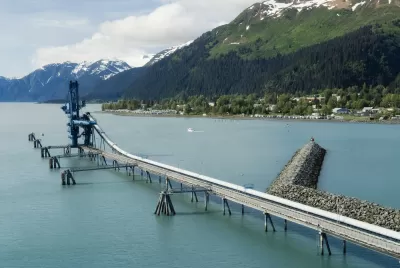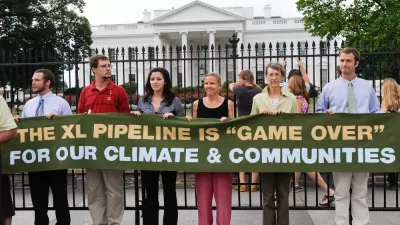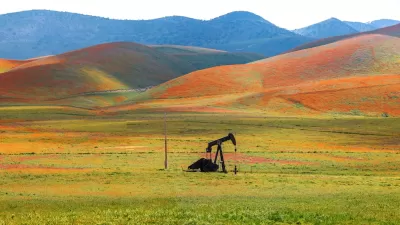The 'Willow' project would pump 600 million gallons of oil and emit 500 metric tons of carbon dioxide in the next 30 years.

"A federal judge’s decision on Wednesday to block a massive oil drilling project in Alaska’s National Petroleum Reserve handed a major victory to Indigenous and environmental advocates," reports Georgina Gustin.
"The so-called 'Willow' project envisioned by ConocoPhillips would extract nearly 600 million barrels of oil over the next three decades," explains Gustin of the project approved by the Trump administration and supported by the Biden administration. Environmentalists sued to stop the project shortly after it was approved last fall.
Judge Sharon L. Gleason of the United States District Court for Alaska agreed with opponents of the project, "writing that the administration’s approval of the project was arbitrary and capricious because it failed to account for the full scope of greenhouse gas emissions or for dangers to wildlife, including polar bears," reports Gustin.
Jeremey Lieb, a lawyer with Earthjustice, which represented several groups in the case, is cited in the article saying the project would add 500 million metric tons of carbon dioxide if allowed to proceed.
While the Biden administration has taken some steps to reverse some of the environmental decisions of the Trump administration affecting the state of Alaska, including a July decision to end the sale of large-scale, old-growth timber in the state's Tongass National Forest, approved by the Trump administration in October 2020.
The Biden administration supported the Willow project, however, "even as it attempts to advance an ambitious agenda that tackles climate change and shifts the country toward a fossil fuel-free future."
FULL STORY: A Federal Judge’s Rejection of a Huge Alaska Oil Drilling Project is the Latest Reversal of Trump Policy

Planetizen Federal Action Tracker
A weekly monitor of how Trump’s orders and actions are impacting planners and planning in America.

San Francisco's School District Spent $105M To Build Affordable Housing for Teachers — And That's Just the Beginning
SFUSD joins a growing list of school districts using their land holdings to address housing affordability challenges faced by their own employees.

The Tiny, Adorable $7,000 Car Turning Japan Onto EVs
The single seat Mibot charges from a regular plug as quickly as an iPad, and is about half the price of an average EV.

Seattle's Plan for Adopting Driverless Cars
Equity, safety, accessibility and affordability are front of mind as the city prepares for robotaxis and other autonomous vehicles.

As Trump Phases Out FEMA, Is It Time to Flee the Floodplains?
With less federal funding available for disaster relief efforts, the need to relocate at-risk communities is more urgent than ever.

With Protected Lanes, 460% More People Commute by Bike
For those needing more ammo, more data proving what we already knew is here.
Urban Design for Planners 1: Software Tools
This six-course series explores essential urban design concepts using open source software and equips planners with the tools they need to participate fully in the urban design process.
Planning for Universal Design
Learn the tools for implementing Universal Design in planning regulations.
Smith Gee Studio
City of Charlotte
City of Camden Redevelopment Agency
City of Astoria
Transportation Research & Education Center (TREC) at Portland State University
US High Speed Rail Association
City of Camden Redevelopment Agency
Municipality of Princeton (NJ)





























